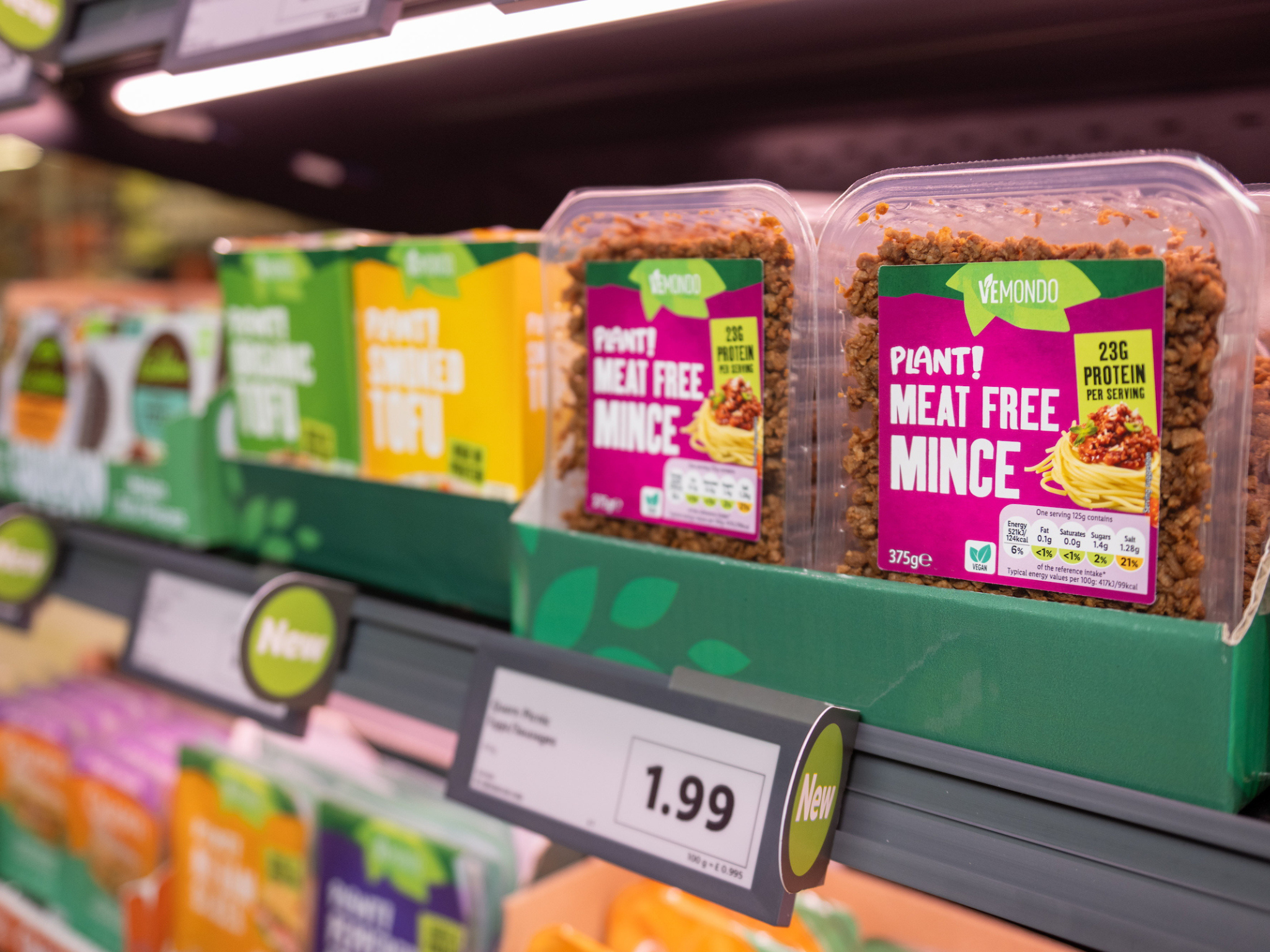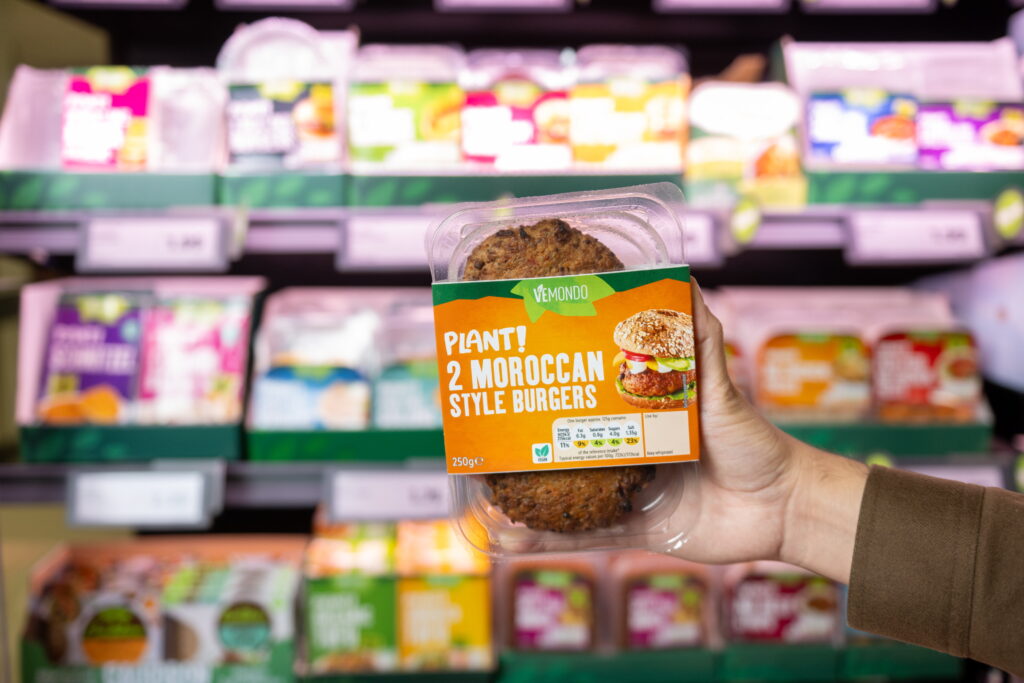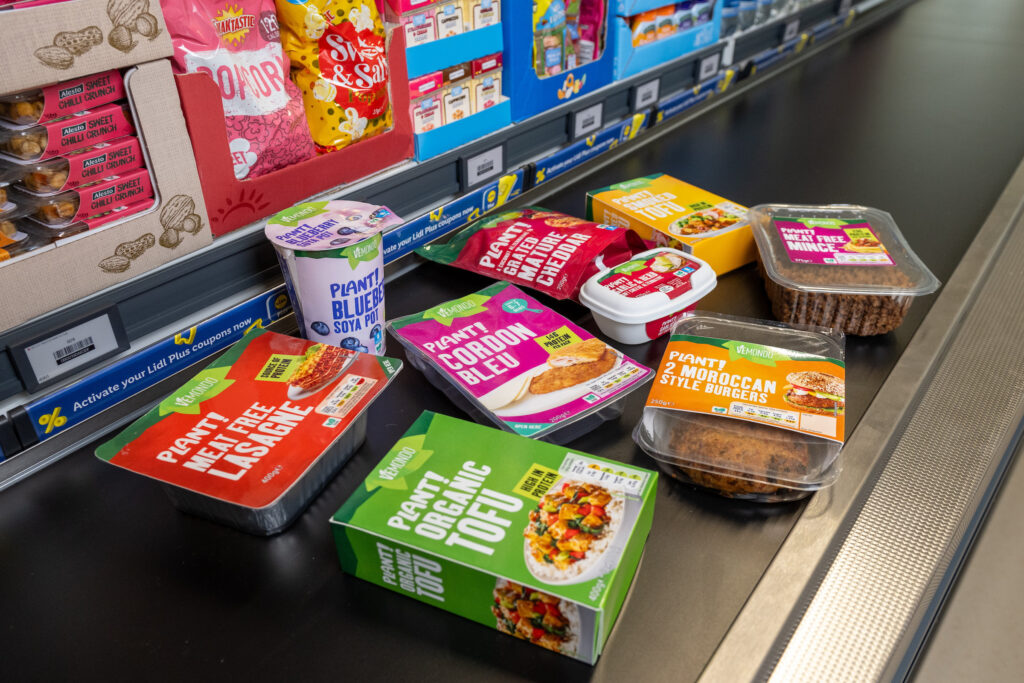
Lidl GB has blown past its target of increasing private-label plant-based sales by 400% by 2025, recording a rise of 694% in the last five years.
Brits are increasingly interested in plant-based foods, and they’re proving that with their wallets.
Discount retailer Lidl, already a retail leader of the protein transition, has announced that sales of plant-based meat, dairy and other products under its own-label brands have skyrocketed by 694% between 2020 and 2025.
This increase not only goes against the grain for vegan food sales in the UK, it also far exceeds Lidl’s own expectations – the retailer had targeted a 400% rise in revenue from these products in this period.
The success has been driven more by Lidl GB’s traditional plant protein and veg-led offerings than meat alternatives, which it sells under the Vemondo Plant label. In response, the retailer has now introduced a range of new products as part of this lineup.
Whole-food plant-based sales outpace meat alternatives at Lidl

Lidl’s original target of a 400% sales hike is part of its wider goal to align with the Eat-Lancet Planetary Health Diet’s goal of slashing red meat intake in half by 2050.
When comparing the top three plant-based products with Lidl’s best-selling meat alternatives, the former items outperform the latter by almost 20%. According to the retailer, this is in line with the demand for wider sources of plant proteins – since the start of the year, it has sold more than 1,400 tonnes of pulses, seeds, and grains.
The discounter is adapting its offerings to meet these trends. The 20 new products rolled out this week include plant-based mince and burgers, but also marinated tofu, falafels, and vegan tortellini.
Across the UK, sales of meat alternatives fell by nearly 10% last year, as Brits opted for whole foods like tofu and beans in an era dominated by ultra-processed food (UPF) concerns, leading even meat alternative makers to develop whole-food options. Plant-based milk also saw a 2% decline in sales – but these products are still bought by a third of UK households.
At the same time, 9% of Brits are either vegan, vegetarian or pescatarian, and another 31% identify as flexitarians. And half of them want to further change their diets by either eating less meat and dairy (33%) and/or more plant-based foods (38%).
In fact, as of May, 65% of Brits had tried at least one plant-based product in the preceding 12 months, with vegetable-based meals and whole plants being the most popular foods, followed by milk and meat alternatives.
The shift away from animal proteins is driven primarily by cost pressures and health worries (cited by a quarter of Brits) – private-label offerings that put nutrition first can deliver on both fronts. Lidl’s new Vemondo Plant products start at £1.49, and the supermarket aims to get all of them certified by The Vegetarian Society.
Lidl strengthens leadership in protein transition

Lidl’s sales success builds on its initiative to expand the number of vegan products it offers. The company has pledged to increase the share of plant-based food it sells globally by 20% by the end of the decade.
And in the UK, it aims to have 25% of all protein sales come from plant-based sources by 2030, rising from 14% in 2021. It is also looking to double the revenue share of non-dairy products from a baseline of 6.4% in 2021.
“Surpassing our 2025 meat-free and milk-alternative sales target marks a significant milestone in our wider healthy and sustainable diets agenda and supports our long-term goal of aligning with the Planetary Health Diet by 2050, a vital lever in the net-zero transition,” said Amali Bunter, head of responsible sourcing and ethical trade at Lidl GB.
“We’re proud to be leading the industry with our protein transition goal of ensuring that plant-based protein sales (by tonnage) account for 25% of our total protein sales by 2030,” she added.
“Alongside this, we are continuing to work closely with our farming partners on the sustainability credentials of our animal-based protein products, providing our customers with a full offering of sustainable choices when they visit our stores.”
Last month, Lidl also rolled out a new Live Well label, which will feature on the packaging of private-label products that align with the Planetary Health Diet. Some of the criteria include the presence of at least one plant protein or whole-grain ingredient, fully recyclable packaging where possible, and being a source of fibre.
The logo is encased in a green-coloured bean, a nod to experts’ call to “make beans more appetising”. A Food Foundation report last year found that beans and grains are, on average, the strongest-performing foods on sustainability, nutrition and price fronts.
Lidl’s playbook for elevating plant-based sales could serve as inspiration for its competitors, which have struggled to keep up with their own targets. The UK’s largest retailer, Tesco, said it is unlikely to reach its goal of increasing meat alternative sales by 300% by 2025 (from a 2012 baseline) – instead, it is now focusing on whole-food plant-based options, with vegetable-led foods now making up 40% of its plant-based sales.
The post With 700% Rise, Lidl UK Exceeds Plant-Based Meat & Dairy Sales Target appeared first on Green Queen.
This post was originally published on Green Queen.